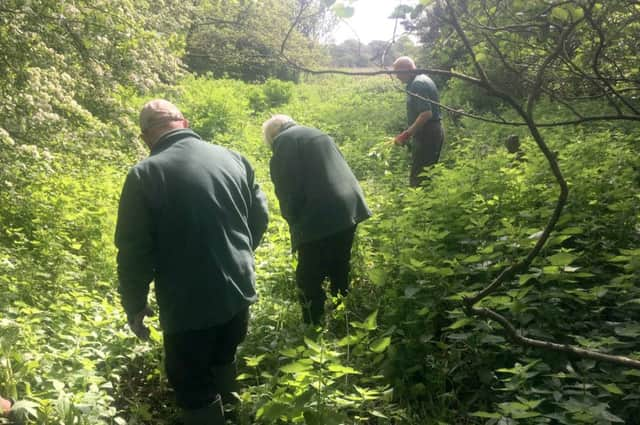Volunteers pitch in to tackle plant invasion at river


Kind-hearted workers clocked up more than 120 hours removing Himalayan balsam from the banks of the river Wallington and one of its tributaries.
Chris Lycett, reserves officer at Hampshire & Isle of Wight Wildlife Trust, said: ‘Himalayan balsam spreads quickly, chokes our rivers, and threatens native wildlife.’
Advertisement
Hide AdAdvertisement
Hide AdIntroduced to the UK by the Victorians as an ornamental garden plant, Himalayan balsam has spread rapidly along riverbanks, out-competing the native wildlife.
Its seed-pods ‘explode’ when ripe and can produce up to 800 seeds.
When the seeds fall into the river they are carried downstream to form large colonies of plants, sometimes reaching four or five metres in height.
The plant produces clusters of purple and pink helmet shaped flowers.
Advertisement
Hide AdAdvertisement
Hide AdIn a bid to help reduce the spread of the plant across the whole of the river system, Hampshire & Isle of Wight Wildlife Trust teamed up with East Hampshire Catchment Partnership to remove the invasive plants.
They were joined by volunteers from the Purbrook & Widley Residents Association and energy company SSE, who cleared about 2km of river banks of the invasive plant.
The main area targeted was on the Potwell Tributary and east of Southwick Village, including a section at the Wildlife Trust’s Hookheath nature reserve.
Dave Carpenter, from Portsmouth, is a volunteer for the Hampshire & Isle of Wight Wildlife Trust and took part in removing the Himalayan balsam.
Advertisement
Hide AdAdvertisement
Hide AdThe 54 year-old said: ‘We were pulling the plants out of the bog before they go to seed and prevent another spread of the plant.
‘It was an imported species and it prevents natural habitats and vegetation from growing.
He added: ‘I became a volunteer with Hampshire Wildlife Trust and this event was one that we had agreed to do as part of our work.’
Chris added: ‘It’s been fantastic working with so many local community groups, businesses and landowners, to make real headway on clearing our rivers and streams of this threat.’
To volunteer for the Hampshire Wildlife Trust visit hiwwt.org.uk/volunteer